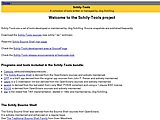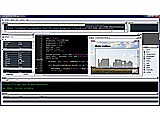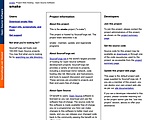 The "Schily" Tool Box is a set of tools written or managed by Jörg Schilling. It includes programs like: cdrecord, cdda2wav, readcd, mkisofs, smake, bsh, bosh, btcflash, cal, calc, calltree, change, compare, count, cpp (K&R original), cstyle, devdump, dmake based on SunPro Make, fdiff, fifo, fsdiff, hdump, isodebug, isodump, isoinfo, isovfy, label, make, man2html, mt, obosh, od, p, POSIX patch, pbosh, printf, sccs, scgcheck, scpio, scut, sdd, sfind, sformat, smake, sh/bosh (Bourne Shell), spaste
The "Schily" Tool Box is a set of tools written or managed by Jörg Schilling. It includes programs like: cdrecord, cdda2wav, readcd, mkisofs, smake, bsh, bosh, btcflash, cal, calc, calltree, change, compare, count, cpp (K&R original), cstyle, devdump, dmake based on SunPro Make, fdiff, fifo, fsdiff, hdump, isodebug, isodump, isoinfo, isovfy, label, make, man2html, mt, obosh, od, p, POSIX patch, pbosh, printf, sccs, scgcheck, scpio, scut, sdd, sfind, sformat, smake, sh/bosh (Bourne Shell), spaste
 mulle-bootstrap, cross platform dependency manager using bash and cmake ... for Linux, OS X, FreeBSD, Windows ... for C, C++, Objective-C ... certainly not a "minimal" or lightweight" project with ca. 10000 lines of shell script code Why you may want it You program in C, C++ or in Objective-C, mulle-bootstrap is written for you If you need to link against a library, that clashes with an installed library, mulle-bootstrap could break this quandary If you feel that apt-get install p
mulle-bootstrap, cross platform dependency manager using bash and cmake ... for Linux, OS X, FreeBSD, Windows ... for C, C++, Objective-C ... certainly not a "minimal" or lightweight" project with ca. 10000 lines of shell script code Why you may want it You program in C, C++ or in Objective-C, mulle-bootstrap is written for you If you need to link against a library, that clashes with an installed library, mulle-bootstrap could break this quandary If you feel that apt-get install p
 * Compiler for the eC Language * Cross-Platform API * 2D Graphics Engine (Bitmaps, Fonts...) * Networking Library (Sockets, Remote objects, HTTP) * Development Environment (Code Editor, Projects, Debugging, Form designer) * Graphical User Interface * 3D Graphics Engine * Database Access (SQLite support) * Build System (Generate cross-platform Makefiles)
* Compiler for the eC Language * Cross-Platform API * 2D Graphics Engine (Bitmaps, Fonts...) * Networking Library (Sockets, Remote objects, HTTP) * Development Environment (Code Editor, Projects, Debugging, Form designer) * Graphical User Interface * 3D Graphics Engine * Database Access (SQLite support) * Build System (Generate cross-platform Makefiles)
 A build tool in the spirit of Make, but with two features that set it apart: (1) Parametrized rules: Like GNU Make's '%' character, but there can be multiple parameters, and they have names. The syntax is '$NAME', where NAME can be any string. (2) Dynamic dependencies: The dependencies of a target can be generated dynamically. When a dependency is enclosed in square brackets, it means that that file is built and dependencies are read from within that file.
A build tool in the spirit of Make, but with two features that set it apart: (1) Parametrized rules: Like GNU Make's '%' character, but there can be multiple parameters, and they have names. The syntax is '$NAME', where NAME can be any string. (2) Dynamic dependencies: The dependencies of a target can be generated dynamically. When a dependency is enclosed in square brackets, it means that that file is built and dependencies are read from within that file.
 smake is a highly portable 'make' program that makes commands up to date based on rules in Makefiles and on the timestamps of the related files. It implements a complete superset of the features of the classical POSIX/Unix make program. It warns about typical misuse of dynamic macros that prevent portability of makefiles. Its automake features allow you to run scripts to automatically create rules for unknown platforms.
smake is a highly portable 'make' program that makes commands up to date based on rules in Makefiles and on the timestamps of the related files. It implements a complete superset of the features of the classical POSIX/Unix make program. It warns about typical misuse of dynamic macros that prevent portability of makefiles. Its automake features allow you to run scripts to automatically create rules for unknown platforms.
|